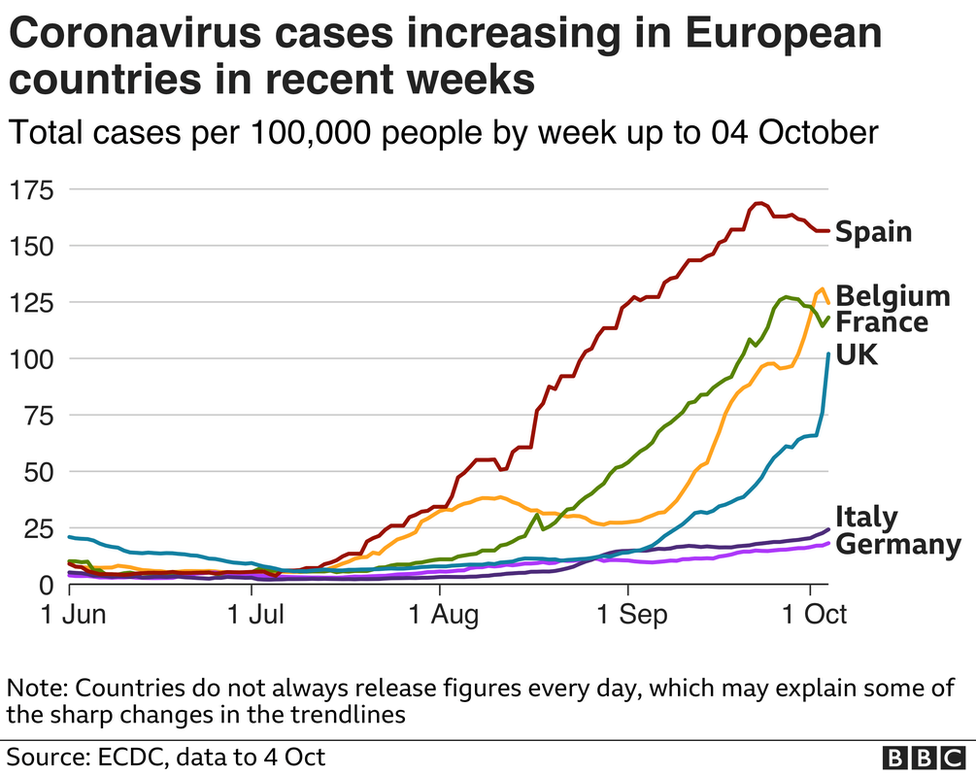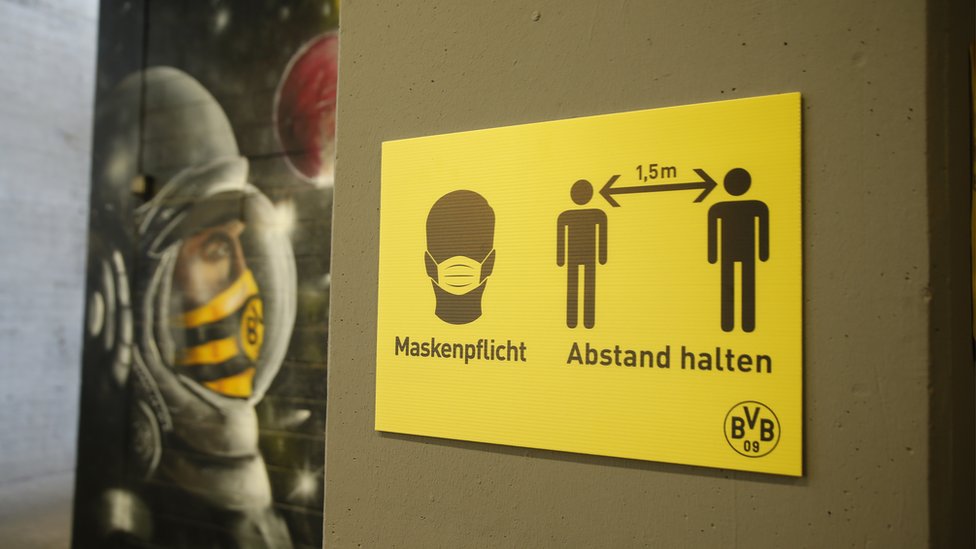As the Covid crisis has unfolded, infection rates have fluctuated and restrictions have proliferated. But it has always felt that there was one idea to cling to: that by working out which countries were doing well - and which were not - there was something to be learned.
After all, historians will surely puzzle over how the countries of Western Europe, with broadly similar economies, produced such drastically different outcomes. So far, at least.
We use international comparisons all the time, of course - they're a way of measuring how our own governments are doing. But even comparing the simplest data can be complex.
There can be differences in how and when death is reported, how co-morbidities are reflected on death certificates, and for how long after a positive test a death is considered to be Covid-related. All will influence how a country's performance at any given moment is measured.
For the moment, the gaps in performance appear to be startling.
The death rate in Germany stands at around 11.5 deaths per 100,000 people, while in neighbouring Belgium it's more than seven times higher at 87 per 100,000. France stands somewhere in between at around 48 per 100,000 while the UK is nearer the top of the European table, at 63.3 per 100,000.
Each is a prosperous country with a capable health-care system and each has applied broadly similar tools to fight the virus, with some combination of lockdowns, social distancing and the encouragement of improved hand hygiene bolstered by localised curfews in some cities.
But the further you look into the data the harder it becomes to explain the differences.
Lombardia and Veneto for example are neighbouring provinces in Northern Italy, but the differences between their experiences are striking - Lombardia's death rate is 167 per 100,000 and Veneto's 43.
It's perhaps because of the sheer difficulty of explaining the numbers that the view from Germany on whether it is doing better than others is more cautious than you might imagine. One factor, it's acknowledged could be timing - how quickly you take action may be as important as the action you take.
The influential German scientist Christian Drosten put it like this ahead of this month's World Health Summit in Berlin: "There are already speeches celebrating German success but it's not very clear where that comes from. We have moved with exactly the same measures as others. We didn't do anything particularly well, we just did it sooner."
Germany does have an extensive testing system, a well-established network of public health track and trace officials, and a greater number of places in intensive care units than most other countries.
But perhaps equally importantly, it has Angela Merkel - one of the few world leaders who is a scientist and who can understand and explain the data herself.
At a news conference after meeting with the heads of Germany's regional governments for example Ms Merkel began one answer with the words: "I simply conducted a model calculation." She proceeded to talk her audience through the maths of exponential growth in a pandemic, concluding with a warning that Germany would need to take extra measures. She was careful to describe the situation as "urgent" but not dramatic.
Christian Drosten says a population that feels well-informed is more likely to comply with government instructions or requests.
As he put it: "I'm reading about support rates of 85-90%, that's a huge accomplishment…everyone knows someone in their own circle who doesn't accept the measures but it's possible to talk to them and that's what we should be doing. I think this is one of the biggest advantages we have in Germany."
Prof Drosten's point is about where science meets society - in other words it's not about the nature of the tools in the toolbox but how the country reacts when the government gets the tools out.
We raised this point with Prof Yves Van Laethem, an advisor to the government of Belgium, who said it was possible his government had confused its public by changing messages too quickly and too often.
'People are wondering why'
He said there was a need now for sustainable and stable measures as winter approaches, but the appetite of the Belgian people for further changes to regulations was limited - a phenomenon which can also be seen in the UK and elsewhere.
"It's a similar problem in Belgium," he says. "The government proposes something and it gets disputed right away….in March and April people were so afraid they were complying and they didn't contest the rules as much. But now people see that as cases are increasing the death rate is remaining low and they wonder why they have to do all these things."
It perhaps explains why Belgium became one of the very few countries to ease a restriction as fears grew of an Autumn second wave.
From the end of July it was compulsory in Belgium to wear a mask at all times, in all public spaces, both indoors and out - even if you were walking alone across a deserted park in the middle of the night.
From 1 October, that rule has been relaxed. Masks are still compulsory in shops and on public transport, but only in crowded public areas outdoors.
By contrast, after months of resisting promoting the use of masks its neighbour, the Netherlands, began tightening its rules, strongly recommending them in shops and on buses. The destination is the same - masks are a good idea in some circumstances, but the direction of travel is very different.
![Did Sweden get it right?. [ 5,895 Total number of confirmed deaths in the country ],[ 94,283 Total number of confirmed cases in the country ] [ 57.6 The 14-day cumulative number of cases per 100,000 people ], Source: Figures correct as of 5 October, 2020, Image: Officials in Sweden](https://ichef.bbci.co.uk/news/1632/idt2/idt2/4057a1f4-752f-4fc5-9584-c7d5f88fea3b/image/816)
Those issues of consistency and sustainability have been associated with Anders Tegnell, Sweden's chief virologist. His advice to leave bars and restaurants open and not to require mask-wearing was questioned in the first phase of the pandemic, but is increasingly borne out by evidence in the second.
It is of course a myth that the Swedish government "did nothing" in response to the crisis. It has taken measures to slow the virus including social distancing and the encouragement of extra hand hygiene. Mr Tegnell talks of the importance of "giving a lot of influence to the population".
Sweden's political culture of calm communitarianism may make the work of the virologist a little easier - and it raises an interesting question about the extent to which outcomes might be determined not just by the measures governments introduce but the reaction to them once they've been announced.
If the German and Swedish populations can be trusted - by and large - to accept instructions and requests from their governments then what about those societies where governments are treated more sceptically, where opposition parties, trades unions, populist newspapers and angry local authorities in the worst-affected areas adopt a contrarian or disputatious approach to central power.
'It's too early now'
In France, for example, the national minister for health, Olivier Veran, announced new rules for the populous southern coastal area around Marseille without consulting the local authorities. The mini-lockdown includes the closure of restaurants and bars.
The regional president, Renaud Muselier, who is a doctor, described the decision as "inappropriate, unilateral and brutal", warning that it would lead to feelings of "rebellion and revolt".
This is not of course an academic debate about epidemiology. Marseille would see itself as a rival of distant Paris and it would never be difficult to summon a sense of resentment of central power there. But it will be interesting to see what effect - if any - the hostile local reaction to the distant central government will have.
There are all sorts of difficulties in making international comparisons at this point in the pandemic - even something as basic as social distancing is complex. France, Germany and the UK for example all have different social distancing measurements - 1m, 1.5m and 2m respectively. But establishing which of those is right and how the balance between risk and convenience was measured will take months, if not years, of study.
The problems of making those comparisons struck me when I happened to be spending some time in the Belgian parliament with one of the country's leading politicians on a day when, by coincidence, scientists and politicians in the UK had been praising aspects of Belgium's response to the second wave.
He was surprised. "Honestly," he said, "you can look at the TV every night and see an expert in Stockholm, or in London, or in Paris, say something slightly different. But of course they're all experts. It's too early now for comparison. Maybe that will be possible next year, maybe we'll have to wait until the year after, but not now."
That leaves us perhaps with one conclusion we can safely draw. That health outcomes in this crisis won't ultimately depend merely on what our governments tell us to do and not to do. They'll depend just as much if not more on the choices we choose to make about what we're told.



Không có nhận xét nào:
Đăng nhận xét